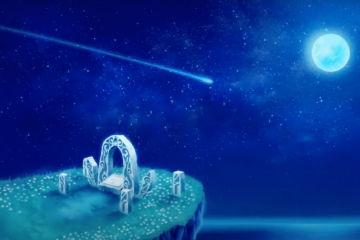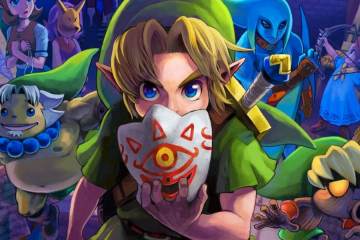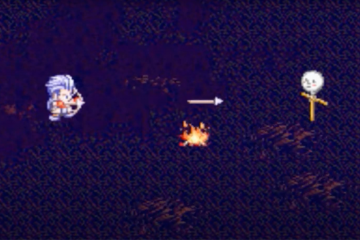
The following is part of Now Loading, a series that renders verdicts on whether or not your favorite video games deserve a place in the canon of works that have contributed to video-game storytelling in landmark ways. Read the series’ full mission statement here.
This Game…This Game Never Changes
Ladies and gentlemen, boys and girls? Here?! *GULP* Hello and welcome to Now Loading…The Video Game Canon! The only weekly Internet column that is being investigated for crimes against The State. The sketch comedy series, not the federal government. Not yet, anyway…
Today on Now Loading, I imagine I will be perturbing quite a few of you in a way I have not yet done. In the business of canonization, you run the risk of alienating large groups of people due to your sometimes-controversial viewpoints. I was aware of that going into this series, but even as I type out this long preamble to what will inevitably be one of the shorter installments of this series, I feel the amorphous, faceless, pulsating rage of The Internet looming up behind me, breathing heavily on the nape of my neck in the way that only a bunch of angered fans with a yet-to-be-defined grudge brewing in their gut can.
Your breath smells like you could stand to drink more water, by the way. Just saying.
Look, I don’t relish writing this article, alright? I mean, sure, I’m typically working with a baseline hum of dread that propels me to do my daily activities, so I’m pretty used to the whole “I have a bad feeling about this” thing, but it doesn’t mean I don’t want to incur your spicy, spicy wrath, you know? Ah well, hopefully in the short time we’ve known each other I’ve accrued enough of your trust to keep you on-board for this piece in which I hesitantly (yet proudly, I must admit) tell you that I think Fallout 3 is terrible and should be left to rot in the bland, gray wasteland it has created for itself.
Would you douse that torch and lower that pitchfork, please? Listen, I have nothing but respect for Bethesda. In fact, they are behind one of my (and Aaron’s, coincidentally) favorite games, Dishonored, and have provided me with hours of entertainment with the Elder Scrolls series. I lost a fair portion of my fourteenth year to Oblivion when I was trying to kick a World of Warcraft habit, so I certainly understand the appeal of the vast, open worlds that Bethesda offers. And while I’m not the biggest fan of Skyrim, I still sunk a few days into it and can appreciate it for the unbelievably ambitious and oftentimes beautiful game that it is. But when it comes to Fallout 3, folks, I have never felt like more of an outsider looking in when it comes to something that seemingly everyone praises for being brilliant. I will admit that it does some interesting things, but it’s just so damn boring.
Released in 2008 to wild success and instant critical acclaim, Fallout 3 takes place in a post-apocalyptic Washington D.C. in the far-off year of 2077. Its open world and customizable level-up system set it apart from other games at the time, while simultaneously paving the way for more and greater open-world games to come after it.
While the game’s world is undeniably huge and feels lived-in, and the characters often present the player with interesting moral dilemmas, the game falls flat in a number of ways and makes so many strange story choices that its induction into the video game canon is dubious at best. That being said, I consider myself a fair and good boy, so let’s strap on our Pip Boys, befriend an old matted dog, and jump into the wasteland with Fallout 3.
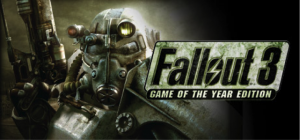
“Game of the Year Edition.” Meaning, “this is a game that we made this year.”
Story and Characters: My Brain Has Many Wrinkles
The brevity with which I write this section is going to so succinctly betray my first and biggest problem with this game that it’s almost comical I’m including the section at all. There are innumerable mission and side-mission characters in this game, so I will not waste time by listing and detailing all of them. I will simply say that when it comes to the characters other than your Liam Neeson dad, they fall into one of three categories. They are either:
- Innocent folks who still believe in goodness in this crazy new world we’ve made for ourselves,
- Addled lunatics who have clung to classism and racism in a world that somehow hilariously still resorts to those constructs. They’re bent on taking everything from you just to prove some poorly-conceived, vaguely nihilistic point.
- Vague science- or war-people who somehow think that some vestige of the old world can be recovered. Spoilers: it can’t.
Then there’s your father, who is trying to bring back clean water to the wasteland, and I’m pretty sure that’s his only character trait. Liam Neeson might as well be wearing his old Jedi robes for how little actual character he has in this game.
See, when a character is only defined by the plot point driving them to do things in the story, it’s a boring character. There’s a difference between a desperate scientist being consumed by his work in the vain hope of restoring the world, and a guy who just needs to do that because something needs to happen in the game. Whether through the script-writing or the piss-poor, boring voice acting Neeson does in this role, it just seems that your father character is the latter and not the former when it comes to motivation.
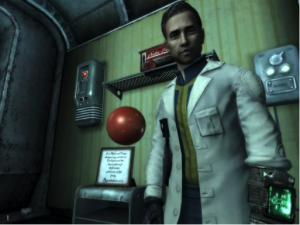
I tried to come up with a Qui-Gon Jin quote for him, but I honestly can’t remember any.
And that water plot is pretty much the whole story. Your father is a scientist who has a plan to purify the water of the entire Potomac River, but the shadowy remnants of the U.S. government known as “the Enclave” want to use the purification system to make the water poisonous to all mutated life, which essentially means anything and everything in the Washington D.C. area due to radiation and, dare I say, FALLOUT.
I know that a lot of people look at this story and find it to be compelling science fiction, but when you break it down to its bare components it is literally “One guy wants to kill everything, and another guy wants to not kill everything.” And while there are many interesting games with compelling stories that utilize this conflict, they all come equipped with intriguing stories, complex characters, and layered conflicts that make the player think about the nature of good and evil. Fallout 3 doesn’t.
When a player engages with something like The Legend of Zelda: Majora’s Mask, even though Skull Kid would like to destroy the world and Link takes issue with that, we understand Skull Kid’s motivations and identify with the initial reason why he wants to destroy the world: he’s lonely, he’s angry, and he’s petulant. We have all had moments when we feel like Skull Kid, but hopefully we all pause and take stock of our lives when the question “Should I commit mass murder?” enters our mind.
Skull Kid’s idea that the world deserves to burn is where most of us would step back and stop identifying with him. But in Fallout 3, we get no such moment like that. The “good guys” and “bad guys” lack identifiable characterization so extensively that they are less like Saturday morning cartoon characters and more like magnetic poles: they are so opposed to one another that there exists no room for nuance, complexity, or characterization beyond “the story needs its characters to be this way.” Morality, as it turns out, is not black and white, and when a story claims to explore the complex nature of good and evil and makes the conflict this simple and lazy, it cannot help but be shallow, without anything interesting to say.
Actually, while we’re on the subject of morality, let’s discuss the “morality system” in Fallout 3, which I have added in quotation marks because you cannot see the vigorous physical ones I am making with my hands right now as I roll my eyes so far back into my head I can actually see these words forming in my brain as I type them out. One of the first moral dilemmas you are met with in the game is whether or not you choose to blow up an entire town with a still-active nuclear bomb sitting at the center of it. Fallout 3 was marketed as being comprised of exciting, thought-provoking, and morally ambiguous choices you would have to make while traversing the wasteland, and one of the first things that you are asked to mull over is “Will you partake in a nuclear holocaust because some guy asked you to?” Then, depending on your decision, you are met with a little message on your heads-up display saying that you have either gained or lost “karma,” a value that affects whether or not you are seen as a good or bad person by others in the wasteland. You know, because committing mass murder via nuclear weapon is one of those things that kinda gets around.

“Yeah, that was me. Pretty cool, right? No? Wait, what do you mean?”
This dilemma and the karma system represent perhaps the biggest issue I have with the three-step method of how this game relates its story to the player.
- It presents you with an obvious moral decision with clear, black-and-white ramifications.
- It gives you very little agency in your decision—often breaking your choices down into “do good option, do bad option, walk away”—but acts as if it is throwing high philosophy at you.
- Finally, you get a literal pop-up message informing you that what you did was either good or bad, and the game rewards you or scolds you with karma points that affect future, similarly easy decisions.
This is a lazy, borderline-manipulative way to get the player to overlook how poorly written the events in the game are and then try to pull the wool over his eyes with the promise of future dilemmas that are no more complicated than deciding between genocide and not genocide.
It would be another case entirely if the pointlessness of these moral decisions was actually thematically relevant in some way, like if the game’s message were that nothing you do in this war-ravaged wasteland actually matters, and sometimes horrible things just happen. But that message is absolutely antithetical to the premise of Fallout series, which goes out of its way to state that war is inherent to human nature, and that it never changes. If war is what defines humanity, then we aren’t living in a futile, nihilistic existence where nothing matters, because we are living in a world that is the result of people making meaningful and impactful choices and then having to deal with them! The entire world of Fallout 3 exists because people made difficult decisions and then had to live with the consequences, but the player can shirk morality and walk away from these huge decisions because the game was not built around morality: it was built around free-roaming and open-world exploration. Morality was sadly tacked on because of the series’ roots, and it ends up being the worst mechanic in the game, period.
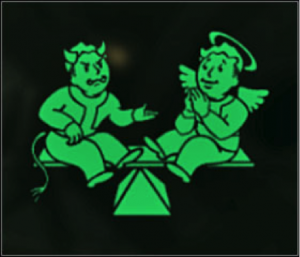
Yes, morality in the game is literally this nuanced.
But hey, the draw to Fallout 3 isn’t necessarily story, characters, or morality (according to Bethesda), but rather the gameplay and vast environment, right? Well, while I am of the opinion that “forget about the story” is a horrible argument when discussing the value of a video game, I once again reiterate that I am a fair and good boy, and will do my best to represent this game justly. (It’s just that story is a pretty huge component of… stories. But, hey, I’ll reserve my snark for later in the article.)
Gameplay, Music, and Visuals: Frank, We Ran Out of Bland
Fallout 3 is your basic, first-person shooter, with some admittedly interesting RPG elements sprinkled on top of it. You have a number of base statistics that affect your strength, health, and ability to carry weight, and you also have secondary skills that help you barter, intimidate, and persuade people. Bethesda is brilliant when it comes to stat customization, and when you are playing a character that you have created in a Bethesda game, you truly feel like you have total control over that avatar. You get to decide how to play the game and how to level up, and for that I commend Fallout 3, just as I would commend any of the Elder Scrolls games.
That being said, Fallout 3 did not really add anything new to this whole skill- and stat-customization system that Bethesda had been tooling around with for years and years in their previous games. It’s something that they perfected long ago in the Elder Scrolls series, and have only been tweaking and changing here and there as they make new games to accommodate the different worlds they have created. So, in my mind, that aspect of gameplay isn’t anything to write home about.
The new aspect of gameplay that Fallout 3 added to the Bethesda formula is the V.A.T.S. system, an interesting mechanic that allows you to slow down time and see an enemy segmented into its various weak points. It gives you a bit more time to decide where to shoot and shows your chance of landing a critical hit, depending on how strong you are, how strong the enemy is, and how clear your shot is.
While the V.A.T.S. system adds an interesting layer of pseudo-real-time strategy gameplay, the way that the rest of the game is designed is so much more fast-paced and brutal that it ultimately breaks up the flow of gameplay. Imagine if Halo gave you the option to stop the firefight, zoom in on an alien, and see that a headshot would probably do a bunch more damage. You already know that a headshot is going to do a ton of damage, so interrupting the smooth FPS combat seems kind of useless. And, much like in Ocarina of Time, once you become familiar with an enemy type and your weapons, you’re not going to ever need to look at V.A.T.S. again.
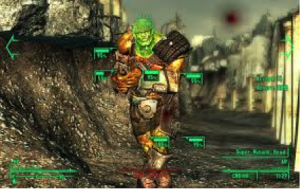
“Ah, the head! Of course! How could I have been so blind?!”
When it comes to the visuals, I think this game is the ugliest I have ever played. I will grant the game that some of the towns and set pieces are visually memorable, like Megaton or Tenpenny Tower, but it’s for the objects and not the color palette.
What I mean by that is this: I remember the huge atom bomb in Megaton, or the striking height of Tenpenny Tower, but those objects are both just blobs of rusted metal and gray dirt. Yes, I understand that Fallout 3 is meant to be a wasteland story, but when it comes to drawing the player into the world, all of the environments blend blandly together.
Wasteland settings don’t have to be visually uninteresting just because they’re wastelands. Take the desert in Mad Max: Fury Road—or even Pandora from Borderlands, if you want another video game example. Both of those stories are set in absolute wastelands, but the color palettes aren’t solely reliant on rusty brown and gray to express this. They are visually striking in their starkness because we see bits and pieces of other, much more visually interesting environments.
I admit that the opening sequence in the Vault is interesting to look at up to a point, but once you get used to the quasi-futuristic-fifties-retro aesthetic, you see that it’s all just sterile laboratory chrome and steel. This game looks boring.

And so begins your gray adventure!
As for music, the only really fun thing about this game are the fifties throwback songs that pop up occasionally in different areas, but they are few and far between, on top of being a little cliched even for a game that came out in 2008. Hell, folks, Stephen King has been writing about post-apocalyptic wastelands with 1950’s Americana nostalgia since the 1970’s, and even then it was a bit hackneyed, thanks to sci-fi writers in the 1960’s. The rest of the music is forgettable ambient score that plays as you explore the broken wastes of Washington D.C. I would be hard-pressed to remember any tune from this game apart from “If I Didn’t Care,” by the Inkspots—which, even as I write this, I think I may be misremembering because of how overplayed that song is in stories like these.
Sorry, Fallout 3: when it comes to gameplay, music and visuals, you’re 0 for 3.
Impact on Video Gaming and Culture: I Know You Think I’m On the Wrong Side of History
This is the section of the article where I cannot help but give this game a point towards canonization, because the impact of this game on Bethesda alone is worth talking about, let alone its impact on gaming culture in general. Fallout 3 has spawned more good reviews, more Game of the Year awards, and more Vault Boy merchandise than I think anyone could have ever dreamed—and I’m including Bethesda in “everyone.”
I think it was a forgone conclusion that the Elder Scrolls series was going to be the series that propelled Bethesda into next-generation gaming, but the massive crowd behind the Fallout franchise came to play for Fallout 3. I don’t much care for this game at all, but I like games that have come after it and taken cues from it. Bethesda itself took a number of things from Fallout 3, seemingly workshopped them, and then put them into Dishonored, one of their all-time greatest games. They took the sort-of-post-apocalyptic landscape, added some variety to the architecture and color palette, and made one of the more visually interesting games to come out in the last few years. I also think that V.A.T.S. must have been meant to be used more as a stealth tactic than anything else, and that translated fairly well into the stealth mechanics of “Dishonored.”
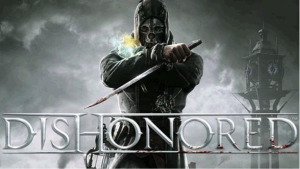
Pictured: A Much Better Game
As for the impact Fallout 3 had on its own series, it spawned a number of DLC packs, spinoffs, and sequels, all of which have done just as well as this game, critically speaking. I am of the personal opinion that Fallout: New Vegas is leagues ahead of Fallout 3 in terms of storytelling, interesting world-building, and characters, to the point that I would be interested in revisiting Fallout 3 later just to talk more about New Vegas. It comes off as a far more competent post-apocalyptic, sci-fi story, with far more interesting moral dilemmas and an ethos that draws you in significantly quicker than Fallout 3.
Then there’s Fallout 4, which I have played through and concluded is basically just Fallout 3 again. From what I can tell of the critical response to that sequel, most people had the same problems with Fallout 4 that I had with Fallout 3, so it seems as if the sins of the father finally caught up with the son in that case. I may be projecting, but all that hate towards Fallout 4′s settlement mini-games and the bland Boston environment just seem to be echoes of my present complaints with this game that everyone went nuts over. It may simply be the case that people had their fill with Fallout 3, and it turns out that open-world gameplay in a dead, dusty world is an oil well that you can really only tap once.
But for all my griping about it, I will concede that Fallout 3 is culturally significant to the gaming landscape. And hey, it’s only a matter of time before Bethesda stops re-releasing Skyrim and starts re-releasing this game, slapping “Game of the Year” on it more times than any rational or sane human with unlimited time and dedication can count.
I mean, really, Bethesda, you bandy about that “Game of the Year” sticker with more vigor than you actually talk about the game that you created. It’s a bumper sticker, guys. It’s the “My kid is an honor student” of video games, and it’s not worth slapping on every lackluster sequel to an incredible property you make just because people are so loyal to the preceding games that every Tom, Dick, and IGN will toss you a pity “Game of the Year” award for the participatory addition you make to a series with an already incredible legacy.
BONUS LEVEL: Vicarious Nostalgia
I will say that the one thing I admire above all else in Fallout 3 and all other Fallout games is that there is an interesting meta-commentary on nostalgia woven throughout these stories. A wasteland story, at its core, is about longing for a type of world that does not and cannot possibly exist anymore. When Cormac McCarthy writes about cannibalism in The Road, he’s really talking about leaps and changes in the modern world to which a man out of time cannot possibly adapt.
In Fallout 3, your character, the Lone Wanderer, was raised in a vault meant to simulate the 1950’s. And yet, it’s not the 1950’s that the player is familiar with: rather, it’s the resurgent version of the 50’s in this world’s universe. At some point, the 1950’s mentality came back to people in the mid 21st century, and so they reverted to the culture of the 1950’s with modern technology overlaid on top of it. Maybe it was a reaction to all the cold-war/nuclear threats, or maybe it was just the natural recurrence of trends that all societies go through.
Regardless of the reason, people in the future reverted back to the mentality of the past in order to live through difficult ordeals. These games, as I see them, have an underlying theme of wanting to go back to a world that you not only never experienced, but a world that also never truly existed at all. Nostalgia is a powerful thing, and it can warp people’s minds to the point that they are unable to accept the present for what it is. And so, in a world ravaged by war and plague, it is only natural that certain people living in it yearn for a made-up fantasy world.
We see nostalgia in the suburban simulation, in the juke boxes, and in the Nuka Cola bottlecaps all over the place. The villains in these games, when they aren’t trying to simply kill everyone with water, are antagonistic because they are actively preventing progress and keeping people in that fantasy world of the past. This, while by no means a new idea, is interestingly woven throughout the fabric of Fallout 3, making nostalgia seem cloying and oppressive to a player who just wants to move forward.
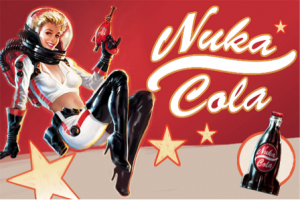
It just couldn’t all be this visually interesting, hmm?
VERDICT: So Long, Waste Cowboy
If you’ve stuck with me this long, you’ve likely realized that Fallout 3 will not be gracing the hallowed halls of the video game canon. While occasionally interesting themes pop up in the game, the overall story is lacking in anything interesting, new, or original. It’s a fairly boring game despite its open world, and the blandness of the world is inescapable. Now, granted, that might be the point of a wasteland game, but who needed a game to tell you that a wasteland would be dull and pointless?
Sorry, Fallout 3, but you are not part of the video game canon. Never change.
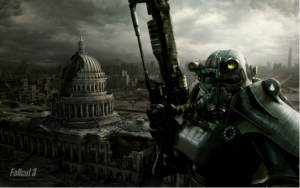
All the gray, muted colors in the world can’t save you.

